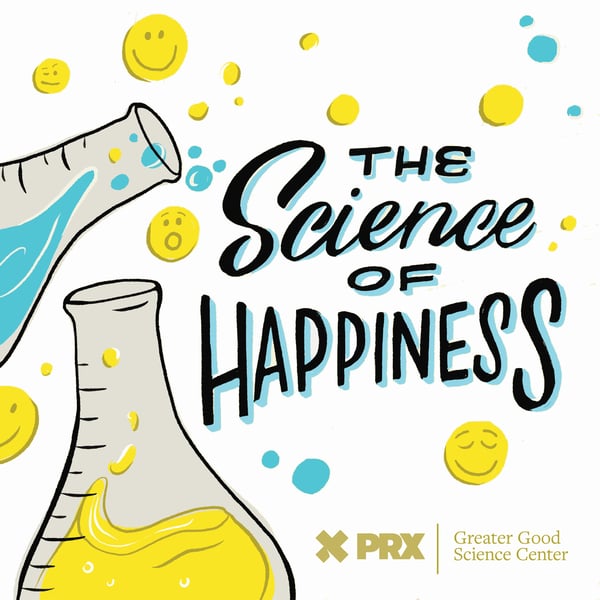Are You Remembering The Good Times?
The Science of Happiness
PRX and Greater Good Science Center
4.4 • 1.9K Ratings
🗓️ 25 April 2024
⏱️ 20 minutes
🧾️ Download transcript
Summary
Link to Transcript: https://tinyurl.com/2r63e6tn
Episode summary:
Whether it’s news notifications or work emails, it’s easy to feel overwhelmed by the stresses of our time every moment of every day. But what if there was something we could do to rekindle the greatest joys of our pasts? How might that shift how we feel in the present moment? Simply reflecting on happy memories has been shown in a lab to reduce stress, activate the reward center in our brain, and uplift our mood. This week, Palestinian-American poet and author Naomi Shihab Nye reminisces on happy memories from her youth and finds the practice soothes her and sparks joyfulness. We also hear from neuroscientist Mauricio Delgado about how the practice changes the way we think and feel, and which types of happy memories serve us best.
Practice:
For one week or more, spend 5-10 minutes each day writing in response to the following prompt:
Think about good memories you have from your past. Write a few paragraphs describing them and one event that you still remember to this date. Please provide as many details as possible, including who was there, so that another person reading what you wrote could understand how you felt at that time.
Today’s guests:
Naomi Shihab Nye is a Palestinian-American poet and author. Her new book of poetry, Grace Notes, will be available May 7.
Order Grace Notes: https://tinyurl.com/st3w6n8t
Check out Naomi’s children’s book about a child visiting her Palestinian grandmother, Sitti’s Secrets: https://tinyurl.com/5embjxuj
Follow Naomi on Instagram: https://tinyurl.com/5hddcf8k
Mauricio Delgado is a psychology professor at Rutgers University who studies social and cognitive neuroscience.
Learn more about Mauricio’s work: https://tinyurl.com/4tt7bp2d
Follow Mauricio on Twitter: https://tinyurl.com/27kvv6j7
More episodes like this one:
Why We Should Look Up at the Sky - https://tinyurl.com/4xs88sye
Why We Need Friends with Shared Interests - https://tinyurl.com/bdesh3he
Related Happiness Breaks:
A Meditation to Connect to Your Roots, With Yuria Celidwen - https://tinyurl.com/3ae3w3z3
Where Did You Come From? Guided Writing, With Lyla June - https://tinyurl.com/ytypxn5t
Tell us about your happiest childhood memories, and what they bring to you now. Email us at [email protected] or use the hashtag #happinesspod.
Help us share The Science of Happiness!
Leave us a 5-star review on Apple Podcasts and share this link with someone who might like the show: https://tinyurl.com/2p9h5aap
Transcript
Click on a timestamp to play from that location
| 0:00.0 | My father had this conviction that if you make hummus at home, which of course all |
| 0:08.8 | Arabs do, he said even if you used canned garbanzo beans, chickpeas, |
| 0:14.8 | you had to boil them down in a pan for them to have the best taste |
| 0:20.1 | and the best consistency in your hummus. |
| 0:29.0 | My father was so convinced that unless you did that, they wouldn't have the richest flavor they could possibly have and he always did it while playing |
| 0:36.2 | classical music at top volume. |
| 0:41.0 | And he's happy, he's happy, he's smiling. |
| 0:45.0 | And the memory, it holds comfort, enormous comfort, |
| 0:51.0 | because you know you're going to have this delicious plate of hummus to eat together afterwards and of course he was always happy eating his original food and it made my mom happy because he was cooking and the house smelled good. |
| 1:04.5 | You know that combination of smell and hearing at the same time, the music. |
| 1:10.6 | There was just a sense of hope of uplift. |
| 1:13.0 | Hi everyone, |
| 1:17.0 | welcome to the science of happiness. |
| 1:21.0 | I'm Shuka Kalantari, the executive producer of the show, |
| 1:24.9 | filling in for Dhaka-Keltner. |
| 1:27.4 | Today on the Science of Happiness, |
| 1:29.0 | we're digging up happy memories |
| 1:30.8 | with Palestinian-American poet and author Naomi Shehab Nye. |
| 1:35.0 | For our show, Naomi tried to practice where she wrote about her own good memories every day for a week, |
| 1:41.0 | with a focus on her childhood. Studies show thinking about positive memories |
| 1:45.7 | makes us more likely to feel a sense of satisfaction in our lives. It can also help |
| 1:50.6 | change negative thought patterns, making us better focusing on the good things happening right now. |
... |
Please login to see the full transcript.
Disclaimer: The podcast and artwork embedded on this page are from PRX and Greater Good Science Center, and are the property of its owner and not affiliated with or endorsed by Tapesearch.
Generated transcripts are the property of PRX and Greater Good Science Center and are distributed freely under the Fair Use doctrine. Transcripts generated by Tapesearch are not guaranteed to be accurate.
Copyright © Tapesearch 2025.

